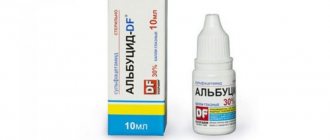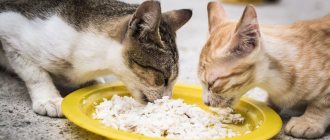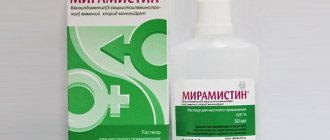The question of whether cats can be given fish - both raw and boiled - many owners of mustachioed and tailed cats do not ask themselves: they simply pamper their pets with mackerel, blue whiting, sprat, even herring, if at the very sight of it the pet begins to meow heart-rendingly, demanding to share . However, we should not forget that most allergic reactions, which are so difficult to get rid of, are caused by natural food in one form or another. In this article we will try to figure out: is it possible to give an animal an endless Thursday or not?
photo from website: pinterest.com
Why cats should be given fish: arguments from owners
Why not? After all, he/she needs it - for health, for shiny fur, in the end, because it has always been like this - from time immemorial! This is the thinking of most owners who succumb to the complaints of their four-legged friends and pamper them with “delicious food”. For them, the benefits of this product are indisputable - after all, it contains Omega-3 and Omega-6 - fatty acids that have an extremely beneficial effect on the body - they prevent the development of many diseases, make the coat glossy and thick, and have an anti-inflammatory effect.
Here are a few more arguments from owners who prefer “natural” to “drying” - river, sea, raw and boiled, smoked and salted:
- Cats have always eaten fish.
This argument can be heard in all disputes devoted to the proper nutrition of our little brothers. They say that for many millennia such fearless hunters took their inhabitants from ponds, rivers and lakes, and then ate them. This proves the attachment of four-legged pets to pike, perch, capelin, whiting. However, in declaring this, we forget that it was man who got the cat addicted to fish. The distant ancestors of our pets were their African wild counterparts. They were even afraid to approach the water, let alone put their paws in it. But they hunted rodents and larger animals with great pleasure. It turns out that a mouse is a more natural food for a domestic cat than the same fish.
photo from website: wallpapersafari.com
- In the villages, all the cats ate fish and did not complain.
Of course, they only lived much less than the city dwellers. Often it was the diet, which included everything that fell from the owner, that became and continues to become the cause of illness and death of village animals. Do you want your cat to suffer the same fate?
- I had a friend whose Fluff/Barsik/Vaska ate fish all the time and lived a long time.
What significance can an example with some Barsik or Vaska have if the body of each pet is individual? Some people have excellent health, while others experience allergy attacks every time the owner feeds them perch or burbot freshly caught from the river. Do not transfer other people's experiences to your pets. Remember: what is a delicacy for one can become real poison for another.
- What about healthy fish oil?
It can be completely replaced by including special additives in the cat’s diet, which we will discuss at the end of the article.
As you can see, all the myths have been destroyed, and the question of whether it is possible to feed a cat raw and boiled fish every day should no longer arise for a caring owner. However, one explanation is not enough; irrefutable evidence of harm is also necessary. After all, if in front of the owner the animal does not feel sick from what he eats, he is unlikely to take a completely different position after hearing arguments against it.
So, let us repeat once again: you cannot overfeed your pet with what you brought from the store or caught in the nearest pond, and this is a fact. Why? We will talk about this in detail below.
Owners' opinions
Owners' opinions on the need to include fish in a pet's diet are very contradictory. Many believe that a natural product is better than any canned food, while others responsibly follow the recommendations of experts and exclude fish from the animal’s daily menu.
Let's look at a few arguments coming from supporters of “fish in a cat's diet” and find out what contradictions there are to their statements. All village and street cats eat fish and have no health problems!
Here it is necessary to note a statistical fact - country and street cats live less than their relatives living at home under the watchful care of the owner. Due to poor nutrition, such representatives quickly develop dangerous diseases that significantly shorten the life of the animal.
A friend of mine's cat ate fish all the time and lived a long and carefree life!
Comparing the life of another animal with your ward is a useless idea. Each living creature has an individual body, so it is impossible to predict exactly how your cat will react to constant consumption of fish. If you do not want to risk the life and health of your beloved cat, it is better to listen to the advice of experienced specialists!
Fish oil is a necessary and very healthy product for cats!
All veterinarians in the world absolutely agree with this argument, but at the same time they still recommend replacing the natural product with artificial additives created specifically for representatives of the feline family.
Such compositions do not contain harmful elements that contribute to the development of various diseases in cats, leading to the early death of the animal.
Why cats should not be given fish in large quantities
photo from the site: thecatsite.com
If you think that the animal’s stomach will easily digest what you put in its bowl by carefully removing the bones or mashing them - when boiling blue whiting or pollock - you are mistaken. Our pets digest this kind of food with great difficulty. And the body of a domesticated animal is not adapted to the composition of fish. Here's an example: the majority of seals fed by their owners to a diet of river and sea creatures develop urolithiasis (UCD).
The fact that a pet enthusiastically devours boiled or fried carp, silver carp or gudgeon does not mean that such food will be good for it. The consequences of monotonous and improper feeding are as follows:
- Fish contains a large amount of salts. They affect the functioning of the kidneys - over time, an important organ fails, and you have to take the animal to the veterinarian to begin treatment. Neutered cats are most susceptible to the harmful effects of salt. And magnesium and phosphorus become the very building materials on which stones are formed.
photo from website: wallpaperist.com
- Can feeding fish worsen a cat's health? Certainly. Let's start with the fact that together with it you can introduce worms into your pet's body, which will then have to be expelled by carrying out mandatory deworming. Another horror story for owners that continues to be relevant to this day is opisthorchiasis. This is the name for prolonged helminthiasis, during which the liver, pancreas, and gall bladder are damaged. That's why cats can't eat raw fish - even if they insist on asking for it.
- If you feed your pet fish every day, be prepared for him to develop hypovitaminosis. The reason for its occurrence is the action of the enzyme thiaminase. It destroys vitamin B1, leads to impaired absorption of iron, and then to anemia. Due to prolonged feeding of natural and “natural” foods for cats, our four-legged friends suffer from a lack of vitamins E and K (necessary for normal blood clotting). As a result of disruption of the synthesis of the latter, any bleeding (even the slightest) can lead to a disappointing outcome.
Why can't cats be fed fish? After all, it contains iodine, which is so useful! Yes, but not in the quantities in which it enters the body of animals that consume this product every day. The consequence of the accumulation of an important element is the development of hyperthyroidism, and with it a dysfunction of the thyroid gland, the occurrence of heart and vascular diseases.
- And finally, one more argument: fish protein is a strong allergen. If you haven't noticed any unpleasant symptoms yet, you're in luck. However, those who have already taken their animal to the clinic and were forced to follow the treatment rules by putting the cat on a strict diet will no longer want to feed their pet only fish.
Here are just a few possible scenarios that could happen in reality if you don’t stop feeding your animal natural products that are harmful to it. And here are additional arguments that lovers of nutrition as close to natural as possible forget about.
Salt and its role in metabolism
When analyzing the situation, it is worth turning to the natural living conditions of cats. The life of urban wild cats should not be taken into account; for the most part, they eat very poorly. Few people know, but due to fundamentally poor nutrition, street cats rarely live to be 5–6 years old, but that’s not the point now.
Let's think about what the ancestors of our pets ate? Meat, internal organs of animals, vegetation including roots. Can a wild cat catch a fish? Most likely yes, but eating it every day is clearly not. Is milk available to a wild cat? Definitely not. Can a feral cat get sausage, pickles, pickled or otherwise seasoned foods? Also no.
Salt is called white death (sugar, too, by the way), but this cliché is very exaggerated. The complete absence of salt in the diet is also no less deadly . Sugar (in the form of a quick carbohydrate, not a treat), like salt, plays an important role in metabolism. However, the main nuance of this understanding is that both salt and sugar are present in a cat’s natural diet and this amount is sufficient. Meat contains a very small amount of salt and carbohydrates, but the cat’s body is adapted to precisely the same doses of these substances. Excessively salty food will lead to leaching of minerals (the cat will drink more), metabolic disorders and health problems.
Every guide to feeding cats includes a ban on table treats. Any rule presupposes a balanced approach, that is, if you treat your pet from your plate, this is not fatal, but if you do this regularly, expect problems.
Wild and domestic cats cannot be compared for a number of reasons. The first of these is genetics. Not a single wild cat was deliberately bred, and purebred pets were selected and selected. A wild cat does not eat food from the store; it hunts organic game. Our pets receive processed, chilled or frozen foods, the natural composition of which is not completely preserved. The only exception is cats hunting mice, but even here everything is not so simple. Hunting within the city can lead not to enriching the body with salt, but to poisoning, viral or fungal disease.
Sodium chloride (salt) is an element of metabolism, without which cells cannot eat . Taking this fact into account, it is not entirely clear why cats should not eat salty foods. Cell walls allow salt and nutrients to pass through to displace potassium as waste products. This is a complex, subtle and at the same time obvious mechanism. There is no salt, there is nothing to “squeeze” potassium out of the cells, we get intoxication and massive death of living tissues. Accidentally or intentionally, this fact is hushed up by modern experts and cat food manufacturers. All these subtleties are described in already yellowed reference books.
Can cats eat fish with bones: sharp and dangerous?
photo from website: siberiantimes.com
Bones are the reason for many visits to the veterinarian:
- They can damage the larynx while the pet chews the meat.
- Passing through the esophagus, sharp fragments scratch its walls and provoke serious injuries and bleeding.
- Once in the animal's intestines, an acute foreign body leads to the onset of an inflammatory process, sepsis or perforation.
Such consequences are not just another exaggeration, but a warning for those who include exclusively pollock, blue whiting, and perch in their pet’s diet, and then complain about their pet: they don’t eat other food at all. Alas, our smaller brothers quickly get used to this menu and demand it again and again. They have no idea how dangerous their favorite treat is in large quantities.
Benefits and harms
Nutritionists recommend including fish dishes in the menu due to their low calorie content. The product contains:
- vitamins A, D, E:
- phosphorus;
- selenium;
- zinc;
- iron.
Marine species contain cobalt, iodine, and fluorine. Fish protein has a small amount of connective tissue, so the product cooks quickly and is easily digested in the stomach. The composition also contains Omega-3 and 6 fatty acids, which are rich in species such as mackerel, tuna, salmon, trout, herring, salmon, and sardines.
Fish products, like milk, contain many mineral salts that are deposited on the walls of the kidneys and provoke inflammatory processes. If the owner prepares too many fish dishes for the pet without the necessary preliminary preparation, the product can harm the body, since the fish:
A poorly prepared product can infect an animal with parasites.
- absorbs toxic substances in water;
- is an allergen;
- accumulates mercury formations;
- is a carrier of parasites.
Is it possible to give a cat smoked, salted fish or river fish with bones?
photo from the site: cutecats.candra.info
The answer is: neither the first, nor the second, nor the third. And that's why:
- Smoked food is very difficult for our four-legged pets. Once in the animal's body, it has a detrimental effect on the liver. Carcinogens formed as a result of processing such fish lead to the development of tumors and destroy the gastric mucosa.
- If you want to offer your cat a piece of herring, think twice. The more salts in the product, the higher the risk of developing urolithiasis. Another danger that awaits tailed lovers of herring, salmon and pink salmon is opisthorchiasis, which we have already described above. So to the question, can cats eat salted fish? There is only one answer: no.
- Bones injure the larynx and esophagus with intestines. Previously, we examined in detail the dangers of skeletal parts entering the animal's body and were convinced that in the worst case, immediate surgical intervention may be required.
Some people manage to feed their cats raw fish without realizing why this should not be done. We remind you once again: a product that has not undergone heat treatment is rich in parasites - there is a high risk of helminthic infestation.
Another argument against is the high content of histamine, which enhances allergic reactions and can provoke a significant deterioration of the condition during serious inflammatory processes. So if you know that your animal is sensitive to all natural food, it is better to switch it to special dry food so as not to risk it.
Signs of salt poisoning in a pet
The main signs of poisoning are:
- vomiting, lack of appetite;
- convulsions;
- lethargic state;
- dehydration, diarrhea;
- thirst;
- frequent urination;
- blindness;
- unsteady gait;
- death.
If your cat shows these signs and has previously eaten salty food, go to the vet immediately. The cat will be given a drip that will help restore the water-salt balance in the body and, if necessary, the urinary canal will be washed. Without help, there is a high chance that the cat will get worse.
Products high in sodium chloride, phosphorus, magnesium and calcium can quickly lead to urinary obstruction and general intoxication. Therefore, you should not give your cat fish or salt the food you have prepared for it. If you don’t have time to cook, it’s better to buy high-quality ready-made food, preferably super-premium class.
What kind of fish can you feed your cat and how often: what is best to give?
photo from website: goldfishcareinformation.com
Does this mean that the animal is not allowed to do absolutely anything? You should not think that one of his many joys has been lost for your pet - you can give tender boiled meat, but only in small quantities. Below we provide recommendations from veterinarians regarding everything caught or purchased on the market:
- River fish should not be given due to the high risk of injury to the pharynx and esophagus and helminthic infestation.
- You can feed sea creatures by first heat-treating them - by boiling and separating the meat from the skeleton, finely chopping it and adding it to porridge or mashed vegetables. Don't forget to remove all the bones. The best option would be to buy fillet. Such a delicacy is permissible extremely rarely - no more than a small portion once a week.
If you are afraid that in this situation your pet will be deprived of useful fish oil, buy special supplements or vitamin complexes designed specifically for tailed fidgets - for example, Nutricoat or Brewers Yeast. With them, all the necessary substances will enter the animal’s body, helping to maintain vigor and excellent health.
So, we figured out what kind of fish can be given to cats - sea fish, thoroughly boiled, lean, boneless and, preferably, fresh. And the basic rule has been repeated more than once: you cannot indulge your pet’s wishes every day - switching to an incorrect and monotonous diet can end in failure. The list of unpleasant consequences of feeding a cat capelin, halibut or a piece of salmon includes the development of urolithiasis, hypovitaminosis, hyperthyroidism, infection with worms, injuries to the esophagus and internal bleeding due to damage to the intestines by sharp bones. Be attentive to the health of your animal and do not offer it potentially dangerous products.











